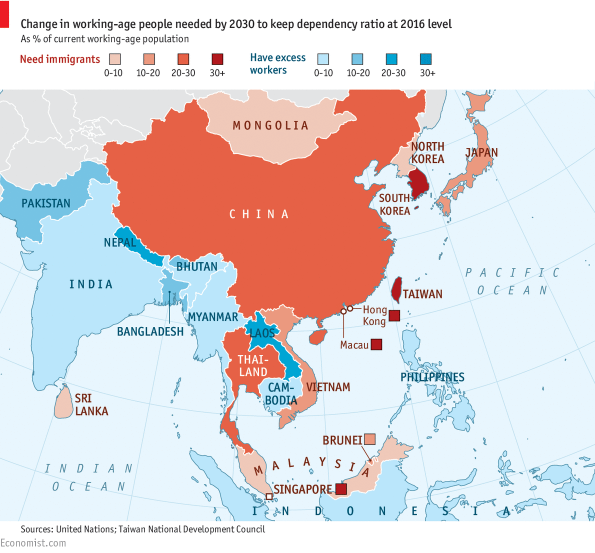Imagine a world with perfect labour mobility — perhaps AI and bots could be the answer

Is there a global talent shortage? Your opinion might depend on your location and your company’s hiring needs. Or does it? Is your company dependent on highly skilled tech or business development professionals? Maybe you’re always on the search for the best creatives or marketing expertise? Let me ask you this: Is your pipeline continuously full of an unlimited supply of motivated professionals that tick all the boxes of your job req? No? I thought so.
If talent is so difficult to find and bots are going to start taking on new jobs, could they be the answer to our talent shortage? Could your next hard-to-find unicorn of an employee be a bot? I know, sounds crazy, right? But a recent article in Tech Times had a dread-inducing headline, “Bots Stealing Human Jobs.”
Before you say, well that won’t be my job, think again. More and more things are now automated, and in the future – who knows? AI might be able to replace you – just look at Siri or Amazon Echo.
Some live in fear of this future. Bill Gates, however, doesn’t – he has a simple answer for those in fear of a jobless future. If you use bots to replace humans – tax the bot as you would a human. Then, use that money to pay for human training for jobs bots can’t do. So while this may be the future, and the future is always uncertain, what is happening right now with labour?
A recent article in The Economist titled, “Migration and Labour Shortages in Asian Countries — Where workers will be needed in the region, and where they could come from” has a very interesting and visual graphic (featured above) that can’t be misconstrued. Or can it? It shows Asian countries in red have a labor shortage and countries in blue have excess workers. The article seems to posit that moving workers from the excess labor country to the nearby country that desperately needs talent would solve all our talent shortage ills (and the countries are right next door – so easy).
How do we address global skills shortages?
Not so fast. The Economist Data Team, no matter how brilliant, is forgetting one key piece of information. Do any of us really think there are direct skill-set matches in the excess labor countries for all of the highly skilled job openings in the labor shortage countries within a region?
Try putting in the words, “labor shortages …” and see what comes up. The three suggestions Google puts in right after you type those words are in this order:
- at all skill levels,
- in US,
- Canada.
Interesting. Even Google knows there’s a skills shortage – AT ALL LEVELS. But let’s not just trust our Google search, this has been a universal topic in all the developed countries for some time. The ageing populations in Europe, Japan, US and even China are leading to a shrinking labor force. Headlines like “Europeans Need Many More Babies to Avert a Population Disaster” are enough to make you think we’re on the brink economically. But what if there was another answer and it was sitting right under our nose?
The right migration model?
What if you removed the geographical constraints entirely? What if this map from The Economist didn’t focus on a single region? What if we expanded the playing field and you could match all the best talent anywhere with specific sector shortages in a labor market? I know what you’re thinking, “That sounds too easy,” — and we all know it’s not that easy.
Fair enough, it’s not so easy. If it were that easy all the hard-to-fill job reqs would find the perfect person all the time (and fast too!). The unspoken secret is that hiring managers often make some kind of compromise to fill a job. After all, at some point you have to cry Uncle and hire someone, even if they won’t be the saviour of your company. Let’s face it, your list of candidates is limited – either by geography, talent availability or say your salary caps – pick one or all. But what if, just like in romance, you imagined there’s a whole wide world out there and the perfect person for you is out there – it’s just a matter of finding them.
But say you had the whole world to choose from for a candidate. How would you do this? Finding the perfect candidate with no obstacles to geography! In other words find the best talent anywhere.
Could the right migration model work here? What stops companies from hiring the best talent from anywhere – essentially a global search for the “perfect” match? First of all, that sounds a bit overwhelming. I’m sure you’re picturing hundreds of thousands of resumes flooding your inbox. But in fact, there are limiters already in place that would prevent that – even if you could open the floodgates, so to say. It turns out most countries have put these constraints on already with immigration quotas and clunky bureaucracy that prevent free movement of workers.
What if we had free flow of labour?
While I don’t have all the answers for solving the talent shortage all around the world, I can safely say some countries are doing a much better job than others. Take my current “home” country of Estonia. They practice an advanced form of residency that has brought about an economic miracle in a country that just 20 years ago was emerging from state-run communism. There is a virtual free-flow of highly skilled labor into the country creating a society bursting with entrepreneurial energy.
Yes, Estonia is one country – and atypical in these times. But what if more countries – and dare I say it – the world, embraced the free flow of labour via similar schemes? Could this solve the talent shortage and inspire a human work evolution on the scale of the envisioned AI revolution and Do you Dream of Electric Sheep?
Want to share your thoughts on this article at Expand on the conversation at the Jobbatical blog.
—-
This article originally appeared on the Jobbatical blog.
The views expressed here are of the author’s, and e27 may not necessarily subscribe to them. e27 invites members from Asia’s tech industry and startup community to share their honest opinions and expert knowledge with our readers. If you are interested in sharing your point of view, submit your post here.
Featured Image Copyright: tomwang / 123RF Stock Photo
The post Are bots the answer to our ever-increasing talent shortage? appeared first on e27.
